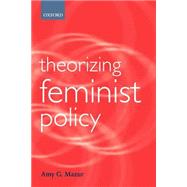Theorizing Feminist Policy
, by Mazur, Amy G.- ISBN: 9780199246724 | 0199246726
- Cover: Paperback
- Copyright: 4/18/2002
Theorizing Feminist Policy avoids the usual clash between feminist analysis and non-feminist social science in mapping out the new field of feminist comparative policy. Instead, it intersects empirical feminist policy analysis with non-feminist policy studies to define and contribute to thisnew and emerging field of study. Consulting a wide sweep of empirical and theoretical work, the book first defines Feminist Comparative Policy showing how it dialogs with the adjacent non-feminist areas of Comparative Public Policy, Comparative Politics, and Public Policy Studies. Theorizing Feminist Policy seeks then to strengthen one of the weakest links of this new area - the study of explicitly feminist government action. In the remaining chapters, the books defines feminist policy as a separate sector, with eight sub sectors - blueprint, political representation,equal employment, reconciliation, family law, reproductive rights, sexuality and violence, and public service delivery. It develops a qualitative and comparative framework for analysing the profiles and styles of feminist policy in post industrial democracies and uses the framework to examine twentyseven different cases of feminist policy formation across thirteen different countries. The initial empirical study makes a case for feminist policy as a new sector of state action, concluding tentatively that successful feminist policy formation is a subtle combination of feminist strategic partnerships, non feminist support, institutions, culture, and international influences. Thesetentative findings also shed new light on the perennial questions of comparative politics and policy: do politics, institutions, national policy style, sector, institutions, or culture matter the most in determining policy processes and outcomes? The books finishes by suggesting the next steps indeveloping comparative theories of feminist policy formation. Theorising Feminist Policy, therefore, goes beyond just describing the dimensions of feminist policy from existing literature, it seeks to systematically contribute to comparative theories of how the contemporary post-industrial state hastaken on social change at the beginning of the 21st century.







